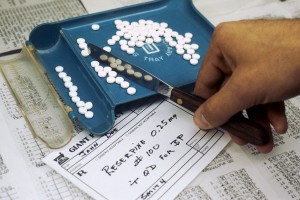 With all of the changes to medical insurance, healthcare and privacy of our medical information is top-of-mind these days for many people. It’s no surprise that a growing emphasis is being placed on HIPAA laws at all levels of the healthcare chain. Even pharmacies have fallen prey to HIPAA lawsuits, demonstrating the need for pharmacy security.
With all of the changes to medical insurance, healthcare and privacy of our medical information is top-of-mind these days for many people. It’s no surprise that a growing emphasis is being placed on HIPAA laws at all levels of the healthcare chain. Even pharmacies have fallen prey to HIPAA lawsuits, demonstrating the need for pharmacy security.
There are four things pharmacies should consider when evaluating their pharmacy security level.
Pharmacy Security Considerations
How Secure is Your Back-of-House Door?
One of the prime targets for entry is the back-of-house door. These doors are typically out of the line of sight, which allows burglars more time to gain access to the building. To increase pharmacy security, you need to ensure the security of your back doors.
There are a few ways to do this:
- Multi-Point Locking Systems. Multi-point locking systems are exit devices that secure into multiple points of the door frame, which makes it very difficult to pry the door open. They tend to run a bit on the high end of the price spectrum, but when you consider the price of a lawsuit should confidential information be compromised, it’s well worth the investment.
- Security Astragals and Latch Guards. Security astragals and latch guards protect the latch side of the door so it cannot be pried open. An astragal extends the full length of the door, whereas, a latch guard just covers the latch. An astragal is the Cadillac and offers the most protection, but it is also more expensive. A latch guard is less expensive and should buy you enough time for the authorities to arrive.
- Heavy-Gauge, Steel-Stiffened Hollow Metal Doors. Traditional exterior doors are made of various gauges of steel; however, to increase your pharmacy security, it is wise to select a heavier duty gauge door. We recommend a 16-gauge steel-stiffened hollow metal door. Steel-stiffened doors have steel ribbed reinforcements on the interior of the door. These doors are much harder to pry open or cut through than a traditional door.
How Secure is Your Pharmacy Lock?
Another major component to pharmacy security is the lock on the door that goes into the pharmacy.
There are certain times when pharmacists have to lock themselves into the pharmacy to perform inventory and medical counts. During these times, no one else should have access to the pharmacy.
Traditional locks can always be unlocked with the use of a key override. Special pharmacy locks can be locked from the inside so the key override will not work. Once the door is unlocked from the inside, the lock goes back into its normal mode.
How Private are Your Consultation Rooms?
You have probably seen a number of consultation rooms pop up in pharmacies. These consultation rooms must remain private for HIPAA purposes.
There are a few options to maintain aesthetics while offering the privacy the law requires, such as doors that have blinds installed in the glass. When you need privacy, you can slide the blinds down, and when the room is vacant, you can slide the blinds out of view.
Another nice option is a frosted glass style and rail door.
How Secure is Your Trash?
There have also been HIPAA lawsuits over disposing of private information in publicly accessible industrial trash dumpsters.
If your dumpsters are publicly accessible, you need to secure them with heavy-duty hasps and heavy-duty padlocks that are either bolt cutter proof or bolt cutter resistant. This will ensure your trash cannot be rifled through.
Pharmacy security is not something to be taken lightly. Taking these simple steps will greatly increase your HIPAA compliance and ability to protect both private information and medications. If you have any questions, feel free to contact us anytime.
